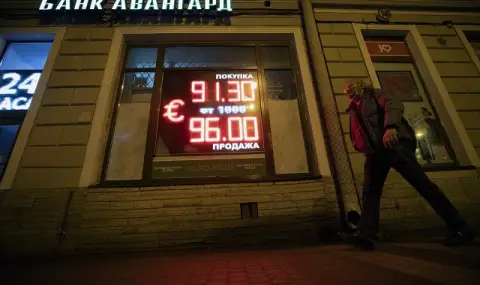This, that the Russian economy is holding up despite sanctions and huge war spending is largely due to military production. But this boom is passing and the problems will deepen, say observers.
In 2025, the Russian economy will become more vulnerable as GDP growth fueled by a two-year military boom comes to an end. New Western sanctions and lower oil prices could lead to a recession in Russia.
The consequences of this are unlikely to be painful for most Russians, as their wages have increased considerably over the past three years. However, income growth is likely to stall and inflation will remain high, observers say.
GDP growth is at the limit of its possibilities
Janis Kluge from the German Foundation “Science and Politics" makes this prediction in an article titled "A turning point for the Russian economy". Based on an analysis of official Russian and other statistical data, the expert concludes that the model of economic growth formed in Russia against the background of the war in Ukraine has reached the limit of its possibilities, despite the 25 percent increase in military spending laid down in the budget for 2025.
The forecast GDP growth between 3.5 and 4 percent in 2024 is explained to a large extent by statistical effects, the article says. In fact, the Russian economy has hardly grown since the beginning of this year, and in September industrial production even began to decline - for the first time in two years.
„This is largely related to the shortage of qualified personnel. In addition, securing new production capacity takes time and is complicated by Western sanctions, the expert notes. According to him, the labor shortage is exacerbated by Russia's demographic problems. “Every year, the number of the population between the ages of 20 and 65 decreases by about one million people. And the gradual increase in the retirement age compensates for this only partially", writes the expert.
At the same time, since the beginning of the war in Ukraine, the influx of labor migrants has fallen to its lowest level in the last ten years, notes Janis Kluge. He explains this circumstance to some extent with the growing concerns of labor migrants in Russia.
As for the production capacities, they must be substantially increased for the continuation of the war in Ukraine with the same intensity, since the remaining stocks of combat equipment and other types of armaments of the USSR are already quite exhausted. And since a tangible expansion of production will hardly be possible due to the shortage of personnel and equipment, the expert predicts that in 2025 Russian enterprises will face growing problems in the production of some weapons systems in the previous volumes.
The role of oil and sanctions
The scale of economic difficulties in Russia next year will also depend on oil prices, the article points out. “A sharp drop in export earnings would significantly exacerbate the situation. The central bank would hardly be able to mitigate the consequences, since the main part of foreign reserves is frozen because of the sanctions. As a result, a strong devaluation of the ruble, a new wave of inflation and recession will become inevitable," Kluge predicted.
Therefore, he believes that in 2025 the Russian economy will become more vulnerable to new international sanctions. Since there is no shortage of oil on the world market, further tightening of measures against Russian oil imports can be assumed, the article says. In addition, the sanctions are likely to cover other important Russian raw materials, such as liquefied gas and fertilizers.
„Through third countries, first of all through China, Russia continues to receive in large volumes the western components it needs for the production of armaments,'' Janis Kluge recalls and emphasizes that for the Russian military machine, access to equipment has crucial. Therefore, the expert recommends that the EU increase pressure on the countries and companies involved in its supplies to Russia.
Growth is also possible
At the same time, Russian economist Sergey Aleksashenko, former Deputy Minister of Finance, believes that the Russian economy has potential for growth next year: “There are signals that since May-June, industrial production has started to slow down, and accordingly has decreased growth in non-military sectors. But it cannot be said that growth has completely stopped".
Aleksashenko cites data, according to which production capacity in many Russian enterprises has reached its limit.
„There are no signs of an impending collapse of the Russian economy - no one currently expects external shocks, such as a sharp drop in oil prices,", the Russian expert points out. As for domestic shocks, such could become, for example, the sharp reduction of military funding after the end of the war in Ukraine. “But something like this is not expected either", points out Aleksashenko.
